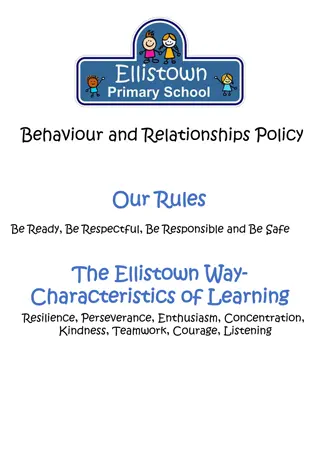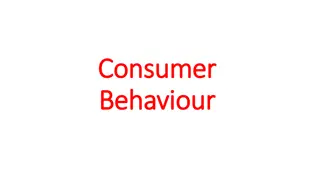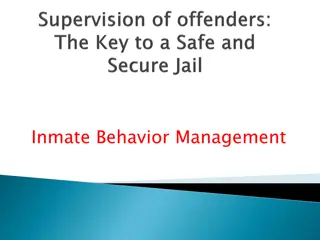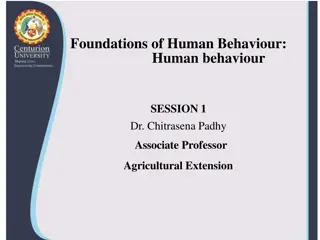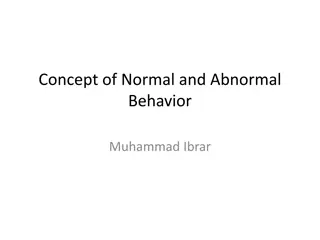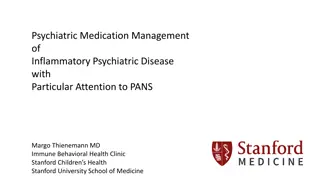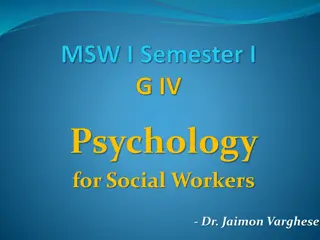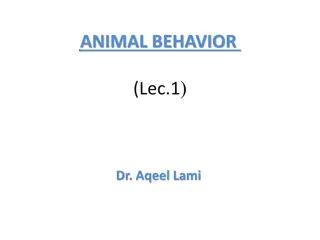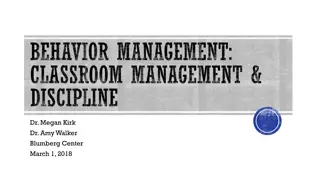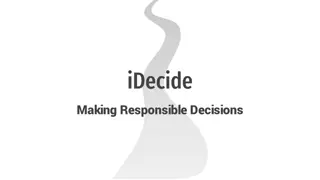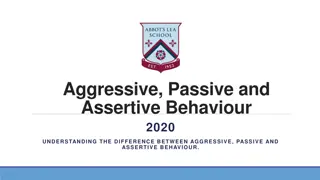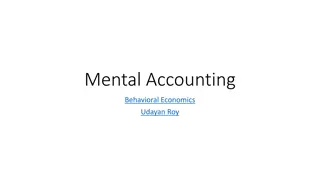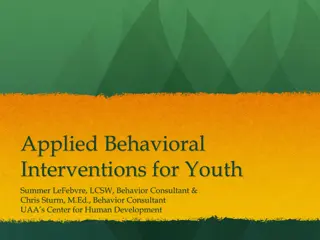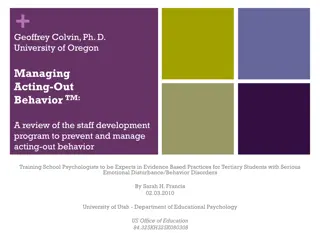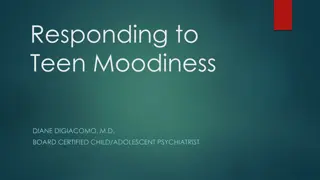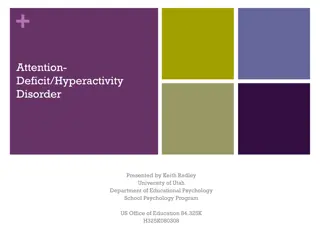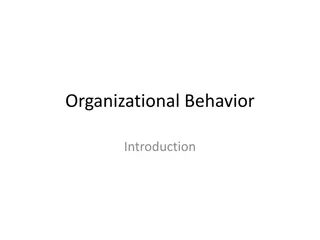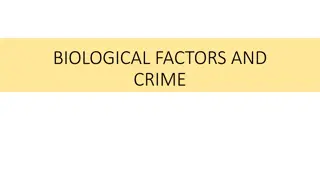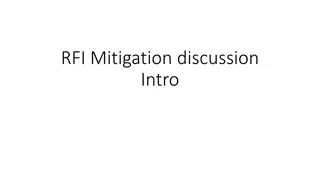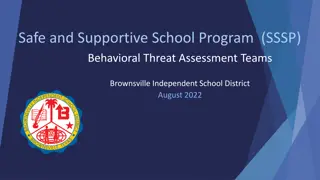Positive Behavior Support Interventions in Education
Learn about Tier 1 Positive Behavior Interventions & Supports (PBIS) developed by California State University and LA Unified School District. Explore evidence-based strategies like effective transitions, praise, choice-making, and establishing routines to promote positive behavior in students. Disco
1 views • 10 slides
Function Based Thinking
Function-based thinking in Missouri Schoolwide Positive Behavior Support, emphasizing data-based decision-making, mission clarity, and effective teaching practices. Understand how behavior is related to the environment and how environmental interventions play a key role in shaping expected behaviors
8 views • 27 slides
Addressing Predatory Behavior in the Fellowship
Predatory behavior, especially towards vulnerable members, is a concerning issue in the fellowship. This behavior includes unwelcome advances, exploitation of power dynamics, and institutional sexism. The discussion on predatory behavior necessitates honest dialogue and a united approach for a safer
3 views • 13 slides
Romeo and Juliet: A Tragic Tale of Love and Fate
Shakespeare's 'Romeo and Juliet' tells the story of two young lovers from feuding families who defy societal expectations in pursuit of their love, only to meet a tragic end. The play explores themes of love, hate, fate, and the consequences of impulsive actions in a society torn apart by conflict.
3 views • 10 slides
GD Bart Puppy Test: Behavior Scoring System Overview
The GD Bart Puppy Test is a standardized behavioral scoring system designed for puppies at 8 weeks of age, focusing on 21 test components to predict success in canine behavior. Conducted by a team of 3 people, the test evaluates stress signals and responsiveness levels to various stimuli. Multiple e
6 views • 15 slides
Examining Parenting and Marriage in "Pride and Prejudice
Delve into the parenting styles of Mr. and Mrs. Bennet, and explore the themes of marriage portrayed in Jane Austen's "Pride and Prejudice." Analyze what constitutes good parenting, reasons for marriage, and the impact of parental influence on their daughters' choices. The narrative unfolds with ins
1 views • 57 slides
Influencing Factors on Voting Behavior: A Comprehensive Analysis
In the realm of voting behavior, factors such as media, social class, age, gender, and more play critical roles. This essay delves into the complexity of factors influencing voting behavior, assessing their relative importance and the balance of their impact. The discussion includes models of voting
0 views • 12 slides
Behavior and Relationships Policy at Ellistown Primary School
Ellistown Primary School aims to create a safe and respectful environment where everyone is ready to engage in learning. The Behavior and Relationships Policy emphasizes positive behavior reinforcement, clear boundaries, and promoting self-esteem. It focuses on fostering good citizenship, teaching s
0 views • 11 slides
Lessons from Peter's Encounter with Jesus in Matthew 14:22-36
Reflect on the story of Jesus walking on water and Peter's attempt to do the same. Through Peter's impulsive actions, we learn valuable lessons on navigating life's challenges with faith. These lessons highlight the importance of focusing on Jesus amidst life's storms and trials.
0 views • 18 slides
Consumer Behavior in Marketing
The design of a marketing program starts with understanding consumer behavior. Consumers, as the end users, play a crucial role in shaping market trends. Producers seek insights into consumer personas, market behaviors, and influencing factors. Management focuses on the consequences of consumer beha
3 views • 26 slides
Psychology: The Science of Behavior and Mental Processes
Psychology is the scientific study of behavior and mental processes. Psychologists study both observable behavior and private mental processes. The primary goals of psychology are to describe, understand, predict, and control behavior. Different branches of psychology, such as applied psychology, cl
2 views • 29 slides
Impulse and Momentum in Particle Motion
Exploring the concept of impulse and momentum in particle dynamics. Learn how these principles are used to solve problems involving force, mass, velocity, and time. Understand the impact of impulsive motion and how it affects the motion of particles in different scenarios.
1 views • 17 slides
Inmate Behavior Management in Correctional Settings
Inmate Behavior Management in correctional facilities involves supervising inmates, implementing corrective discipline, and fostering a fair and consistent environment. It emphasizes the importance of behavior management plans, identifying undesirable traits in supervision, and passing educational a
1 views • 19 slides
Human Behavior: Foundations and Factors
Human behavior is a multifaceted subject influenced by genetic makeup, culture, and individual values. It encompasses both overt actions and covert thoughts, a product of the individual and environmental factors. Psychologists study behavior from visible (overt) actions like playing football to inne
0 views • 20 slides
Normal and Abnormal Behavior: Perspectives and Definitions
Normal behavior varies from person to person and society, influenced by individual preferences and societal norms. Abnormal behavior is characterized by an inability to function effectively or personal discomfort. The concept of normality and abnormality in psychology raises complex questions about
3 views • 8 slides
Management of Inflammatory Psychiatric Disease with Focus on PANS in Pediatric Patient
Dr. Margo Thienemann discusses the psychiatric medication management of a 10-year-old boy with inflammatory psychiatric disease, particularly focusing on Pediatric Acute-onset Neuropsychiatric Syndrome (PANS). The patient presented with various symptoms including compulsions, mood swings, OCD, oppos
0 views • 45 slides
Analysis of Sammy in "A&P" by John Updike
In John Updike's "A&P," Sammy is depicted as a complex character who exhibits traits of boredom, insecurity, and impulsiveness. Various interpretations describe him as a typical American male with good intentions, insecure and unsure of himself, and a young, rash teenager. The story explores themes
0 views • 16 slides
Human Behavior: Insights for Social Workers
This material delves into the intricacies of human behavior, exploring factors influencing behavior such as heredity, environment, intelligence, needs, and motives. It covers the concept of human behavior, stages in life from conception to old age, and theories of human development by eminent psycho
2 views • 71 slides
Animal Behavior and Ecology
Animal behavior encompasses a range of activities such as feeding, breeding, and social interactions. Ethology focuses on studying behavior in natural environments, while behavioral ecology examines ecological aspects like predator-prey interactions. Sociobiology delves into the evolution of social
3 views • 5 slides
Behavior Management in Classroom Settings
Explore the essential topics of behavior management, classroom strategies, and discipline in educational settings. Delve into the functions of behavior, impact of trauma on learning, and effective management techniques. Learn how to identify underlying reasons for student behaviors, discuss behavior
0 views • 76 slides
Analysis of Themes in Hitchcock's Psycho: A Psychological Thriller
Hitchcock's "Psycho" delves into themes of past influencing the present, abnormal parent-child dynamics, and the unraveling of protagonist Marion Crane's impulsive journey leading to her encounter with Norman Bates. The narrative intricately weaves psychological tension, suspense, and ominous foresh
0 views • 15 slides
Analysis of Claudio's Character Development in "Much Ado About Nothing
In Shakespeare's "Much Ado About Nothing," Claudio's character undergoes significant development. Initially respected for his valor, he reveals his immaturity in love, possessiveness over Hero, and later, a heartless side. The metaphorical language used highlights his journey from a lion on the batt
0 views • 21 slides
Targeting Emotions to Facilitate Behavior Change in Older Adults
Efforts in changing health behavior have traditionally focused on social and cognitive factors, but recent evidence highlights the importance of affective states in decision-making and behavior change. Janey Peterson discusses the role of emotions in achieving and sustaining behavior change to benef
0 views • 11 slides
Antisocial Behavior in Children and Adolescents: Risk Factors and Implications
Exploring the development of disruptive behaviors in children and adolescents, this content sheds light on the risk of evolving into an antisocial lifestyle. It discusses various factors such as early onset, organized crime influence, lack of support structures, and educational challenges. Additiona
0 views • 45 slides
Grading Criteria for Effort and Behavior in Educational Reporting
Effort and behavior in educational settings are evaluated based on criteria ranging from Excellent to Causing Concern. Pupils demonstrating excellent behavior show respect, responsibility, and positive engagement in learning. Those with good behavior exhibit cooperation and respect for others, albei
0 views • 9 slides
Mastering the Art of Decision-Making
Explore the importance of responsible decision-making, understand the impact of decisions on oneself and others, learn to differentiate between impulsive and thoughtful decisions, and follow a structured Decision-Making Model to achieve goals successfully. Delve into the essence of making good decis
0 views • 10 slides
Aggressive, Passive, and Assertive Behavior in 2020
Aggressive behavior is reactionary and impulsive, often leading to rule-breaking and violence. Passive behavior involves failing to express thoughts and feelings, allowing others to disregard your rights. Assertive behavior means standing up for your rights in a calm and positive manner, without bei
0 views • 11 slides
Insights into Mental Accounting and Self-Control in Behavioral Economics
Herbert Simon and Richard Thaler are pioneers in behavioral economics, emphasizing the human tendency to seek satisfactory rather than optimal solutions. Mental accounting involves categorizing expenses into different accounts, limiting the fungibility of money. Thaler's example of Gene Hackman and
0 views • 34 slides
Applied Behavior Analysis (ABA) for Youth Interventions
Applied Behavior Analysis (ABA) is a science focusing on improving human behavior by increasing desired behaviors, teaching new skills, and generalizing behaviors. ABA emphasizes observable behaviors, measurement of behavior change, and the use of interventions in various settings like classrooms an
0 views • 25 slides
PBIS Expectations and Behavior Flowchart
The PBIS flowchart outlines behavior expectations and interventions for minor and major incidents in a school setting. It covers disrespectful behavior, disruption, defiance, property damage, theft, possession of weapons, and more. The flowchart guides teachers and staff on managing and addressing s
0 views • 6 slides
Managing Acting-Out Behavior: A Staff Development Program Review
This review discusses a staff development program created by Geoffrey Colvin, Ph.D., from the University of Oregon, focusing on preventing and managing acting-out behavior in students with emotional disturbance or behavior disorders. The program includes video presentations, strategies for behavior
0 views • 22 slides
Teen Moodiness: A Psychiatrist's Insight into Adolescence
Adolescence brings significant hormonal changes that impact teens' emotions and behaviors. This phase, characterized by mood swings and impulsive actions, is a natural part of development influenced by brain structure alterations and psychological adaptations. As adolescents navigate the journey of
0 views • 13 slides
ADHD Subtypes and Diagnosis Criteria in DSM-IV-TR
ADHD, as defined in the DSM-IV-TR, encompasses three subtypes: Predominantly Inattentive Type, Predominantly Hyperactive-Impulsive Type, and Combined Type. To meet diagnostic criteria for each subtype, specific symptoms must be present for a certain duration and at a degree that is maladaptive. Indi
0 views • 23 slides
Organizational Behavior and Individual Behavior
Organizational Behavior (OB) is a multidisciplinary field that combines knowledge from various disciplines to study and manage organizations effectively. It emphasizes the application of this knowledge to enhance organizational effectiveness and the well-being of participants. OB is a useful concept
0 views • 38 slides
Function-Based Behavior Support Plans: A Comprehensive Guide
Explore the process of developing Function-Based Behavior Support Plans (BSP) using Functional Behavioral Assessment (FBA). Understand the concepts of function and functional behavior assessment, learn how FBA/BSP fits within a multi-tiered support system, and practice developing BSP for students. D
0 views • 74 slides
Biological Factors and Crime: Genetics, Neurotransmitters, Neuro-biology
Biological factors such as genetics, neurotransmitters, and neuro-biology play significant roles in influencing criminal behavior. Genetics can predispose individuals to antisocial behavior, neurotransmitters like serotonin and norepinephrine impact social behavior, and neuro-biological damage can l
0 views • 13 slides
RFI Mitigation Strategies in Radio Astronomy
Explore the key considerations and challenges related to Radio Frequency Interference (RFI) in radio astronomy, including when to consider RFI, important categories of RFI, and examples of RFI mitigation efforts at OVRO-LWA. Learn about dealing with persistent narrow-band RFI and impulsive or transi
0 views • 5 slides
School Safety and Threat Assessment Program Overview
Fact-based Threat Assessment for Safe and Supportive School Programs involves identifying, inquiring, assessing, and managing potentially dangerous situations. It aims to distinguish between those making threats and those posing real risks, without profiling or labeling individuals. Understanding th
0 views • 20 slides
Plans
Behavior intervention plans are essential tools that focus on modifying behaviors through applied behavior analysis techniques, addressing functions of behavior and consequences in various settings. Learn about behavior analysis principles, functions of behavior, and why behaviors occur to effective
2 views • 56 slides
Women in Science Education Day - Sept 29th, 2016
Personal insights, effective communications, stronger teams. Spontaneous, impulsive, stable, methodical, planner. Idealistic, sincere, rational, curious, complex, adventurous, daring, hurried, traditional, responsible, dependable, faithful, compassionate. Inspirational, logical, analytical, loner, e
0 views • 21 slides







